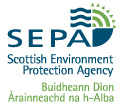Queensland's Environmental Protection Agency (abbreviated to EPA) was for some time a separate department of the Queensland Government, and, following 2009 state elections, became a part of the Government's larger Department of Environment and Science. [1]
This part of the Department of Environment and Resource Management's role is to manage climate change and protect the environment on behalf of the Queensland Government.
To achieve this the section aims to provide Conservation and Environmental Services: including a Queensland Parks and Wildlife Service to manage the Queensland's protected area estate; plus Environmental Services to assist manage development, business, and industry. It aims to promote Sustainable futures: including planning for climate change; encouraging environmental sustainability, supporting environmental innovation, and developing strategies and policies to achieve an environmentally sustainable future; and achieve organisational performance and capability: including building a "robust" scientific base to government policy and decision making, and valuing people and accumulating knowledge within the organisation.

Conservation in Australia is an issue of state and federal policy. Australia is one of the most biologically diverse countries in the world, with a large portion of species endemic to Australia. Preserving this wealth of biodiversity is important for future generations.

The Department for Environment, Food and Rural Affairs (Defra) is a department of His Majesty's Government responsible for environmental protection, food production and standards, agriculture, fisheries and rural communities in the United Kingdom. Concordats set out agreed frameworks for co operation, between it and the Scottish Government, Welsh Government and Northern Ireland Executive, which have devolved responsibilities for these matters in their respective nations.

Environmental protection is the practice of protecting the natural environment by individuals, organizations and governments. Its objectives are to conserve natural resources and the existing natural environment and, where possible, to repair damage and reverse trends.
The Australian Department of the Environment was a department of the Government of Australia that existed between September 2013 and July 2016. The department was charged with responsibility for developing and implementing national policy, programs and legislation to protect and conserve Australia's environment and heritage.

The Australian Conservation Foundation (ACF) is Australia's national environmental organisation, launched in 1965 in response to a proposal by the World Wide Fund for Nature for a more co-ordinated approach to sustainability.

Environmental resource management is the management of the interaction and impact of human societies on the environment. It is not, as the phrase might suggest, the management of the environment itself. Environmental resources management aims to ensure that ecosystem services are protected and maintained for future human generations, and also maintain ecosystem integrity through considering ethical, economic, and scientific (ecological) variables. Environmental resource management tries to identify factors affected by conflicts that rise between meeting needs and protecting resources. It is thus linked to environmental protection, sustainability, integrated landscape management, natural resource management, fisheries management, forest management, and wildlife management, and others.

The Scottish Environment Protection Agency is Scotland's environmental regulator and national flood forecasting, flood warning and strategic flood risk management authority. Its main role is to protect and improve Scotland's environment. SEPA does this by helping business and industry to understand their environmental responsibilities, enabling customers to comply with legislation and good practice and to realise the economic benefits of good environmental practice. One of the ways SEPA does this is through the NetRegs environmental guidance service. It protects communities by regulating activities that can cause harmful pollution and by monitoring the quality of Scotland's air, land and water. The regulations it implements also cover the storage, transport and disposal of radioactive materials.

Environmental policy is the commitment of an organization or government to the laws, regulations, and other policy mechanisms concerning environmental issues. These issues generally include air and water pollution, waste management, ecosystem management, maintenance of biodiversity, the management of natural resources, wildlife and endangered species. For example, concerning environmental policy, the implementation of an eco-energy-oriented policy at a global level to address the issues of global warming and climate changes could be addressed. Policies concerning energy or regulation of toxic substances including pesticides and many types of industrial waste are part of the topic of environmental policy. This policy can be deliberately taken to influence human activities and thereby prevent undesirable effects on the biophysical environment and natural resources, as well as to make sure that changes in the environment do not have unacceptable effects on humans.

The New South Wales Office of Environment and Heritage (OEH), a former division of the Government of New South Wales between April 2011 and July 2019, was responsible for the care and protection of the environment and heritage, which includes the natural environment, Aboriginal country, culture and heritage, and built heritage in New South Wales, Australia. The OEH supported the community, business and government in protecting, strengthening and making the most of a healthy environment and economy within the state. The OEH was part of the Department of Planning and Environment cluster and managed national parks and reserves.

Environmental planning is the process of facilitating decision making to carry out land development with the consideration given to the natural environment, social, political, economic and governance factors and provides a holistic framework to achieve sustainable outcomes. A major goal of environmental planning is to create sustainable communities, which aim to conserve and protect undeveloped land.

Sustainable forest management (SFM) is the management of forests according to the principles of sustainable development. Sustainable forest management has to keep the balance between three main pillars: ecological, economic and socio-cultural. Sustainable forestry can seem contradicting to some individuals as the act of logging trees is not sustainable. However, the goal of sustainable forestry is to allow for a balance to be found between ethical forestry and maintaining biodiversity through the means of maintaining natural patterns of disturbance and regeneration. The forestry industry mitigates climate change by boosting carbon storage in growing trees and soils and improving the sustainable supply of renewable raw materials via sustainable forest management. Successfully achieving sustainable forest management will provide integrated benefits to all, ranging from safeguarding local livelihoods to protecting biodiversity and ecosystems provided by forests, reducing rural poverty and mitigating some of the effects of climate change. Forest conservation is essential to stop climate change.
Kaitiaki is a New Zealand Māori term used for the concept of guardianship, for the sky, the sea, and the land. A kaitiaki is a guardian, and the process and practices of protecting and looking after the environment are referred to as kaitiakitanga.

In ecology, resilience is the capacity of an ecosystem to respond to a perturbation or disturbance by resisting damage and recovering quickly. Such perturbations and disturbances can include stochastic events such as fires, flooding, windstorms, insect population explosions, and human activities such as deforestation, fracking of the ground for oil extraction, pesticide sprayed in soil, and the introduction of exotic plant or animal species. Disturbances of sufficient magnitude or duration can profoundly affect an ecosystem and may force an ecosystem to reach a threshold beyond which a different regime of processes and structures predominates. When such thresholds are associated with a critical or bifurcation point, these regime shifts may also be referred to as critical transitions.
Soil policy in Victoria refers to the policies of soil governance in the Australian state of Victoria. In a 10-year vision for the environment of Victoria which is spelled out in "Growing Victoria Together", one of the goals is that "the condition of our land will improve as the impact of salinity and soil degradation is reduced". Complementing "Growing Victoria Together" is "Our Environment: Our Future", which is a framework for Victoria's environmental sustainability. This defines a "long term and integrated approach" that seeks to "maximise our future economic growth, maintain our quality of life and protect our unique Victorian environment". This is to be achieved by:
Manitoba Environment, Climate and Parks is a department of the Government of Manitoba that oversees that province's environmental stewardship, species at risk, provincial parks, forestry, and other matters related to Manitoba's biodiversity of natural resources.

The Marine Management Organisation (MMO) is an executive non-departmental public body in the United Kingdom established under the Marine and Coastal Access Act 2009, with responsibility for English waters. The MMO exists to make a significant contribution to sustainable development in the marine area, and to promote the UK government's vision for clean, healthy, safe, productive and biologically diverse oceans and seas. The MMO aims to focus all of its activities and resources to meet its mission of enabling sustainable growth in the UK's marine area through 5 strategic outcomes:
Environmental governance is a concept in environmental policy that steers markets, technology and society towards achieving the goal of sustainability. It considers social, economic and environmental aspects in the decision making of its policies.

The International Resource Panel is a scientific panel of experts that aims to help nations use natural resources sustainably without compromising economic growth and human needs. It provides independent scientific assessments and expert advice on a variety of areas, including:
Sustainable land management (SLM) refers to practices and technologies that aim to integrate the management of land, water, and other environmental resources to meet human needs while ensuring long-term sustainability, ecosystem services, biodiversity, and livelihoods. The term is used, for example, in regional planning and soil or environmental protection, as well as in property and estate management.
Climate change education (CCE) is education that aims to address and develop effective responses to climate change. It helps learners understand the causes and consequences of climate change, prepares them to live with the impacts of climate change and empowers learners to take appropriate actions to adopt more sustainable lifestyles. Climate change and climate change education are global challenges that can be anchored in the curriculum in order to provide local learning and widen up mindset shits on how climate change can be mitigated. In such as case CCE is more than climate change literacy but understanding ways of dealing with climate